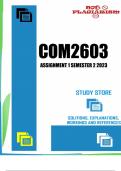COM2603
ASSIGNMENT 1 SEMESTER 2 2023
,SECTION 1
INTERCULTURAL COMMUNICATION
QUESTION 1
Read the scenario below and answer the questions that follow.
Managers at Z&B, a United States (US) multinational coffee shop in Kenya, are trying to
understand the culture of their employees and customers on the African continent.
They have noted that, unlike their US customers, Kenyan customers show respect to
older managers and do not speak rudely to them, even when they are angry.
They have also observed that some Kenyan customers are very rude and speak English
with an American accent, especially those who live in urban areas.
The managers want to understand African culture, so the company can find the best way
to communicate with its African customers.
As an intercultural communication expert, you have been asked to define culture, so that
the managers can have a deeper understanding of what it entails.
1.1 Describe the following characteristics of culture, by using examples from the
scenario above.
1.1.1 Culture is shared (5)
1.1.2 Culture is dynamic and heterogeneous (5)
, ANSWERS
1.1.1 Culture is shared:
Culture is a shared set of beliefs, values, customs, behaviors, and attitudes that
are transmitted and maintained within a specific group of people. In the scenario
provided, we can see several examples of shared cultural elements among the
Kenyan customers and employees:
a) Respect for older managers: The fact that Kenyan customers show respect to
older managers is a cultural characteristic that is shared within their society. It
indicates a cultural norm of valuing and honoring elders, which is likely ingrained
in their upbringing and societal traditions.
b) Politeness even when angry: Another shared aspect of culture is the norm of
maintaining politeness and not speaking rudely to older managers, even when
they are angry. This suggests a cultural emphasis on maintaining harmony and
respect in interpersonal interactions, even in challenging situations.
1.1.2 Culture is dynamic and heterogeneous:
Culture is not static; it evolves and changes over time due to various factors like
globalization, interactions with other cultures, technological advancements, and
social shifts. It is also heterogeneous, meaning it is diverse and can vary even
within the same cultural group. In the scenario, we can find examples of dynamic
and heterogeneous cultural aspects:
a) Urban areas and American accent: The fact that some Kenyan customers in
urban areas speak English with an American accent highlights the dynamic
nature of culture. Urbanization, exposure to international media, and interactions
with American culture might have influenced their language and accent
preferences, showcasing how cultural practices can adapt and change in
response to external influences.
b) Diverse customer behavior: The observation that some Kenyan customers are
very rude while others are respectful indicates cultural heterogeneity. There may
be different cultural backgrounds, beliefs, and experiences influencing their
behavior, even within the same Kenyan context. This shows that culture is not a
monolithic entity, but a blend of diverse practices and attitudes held by various
individuals within a society.




